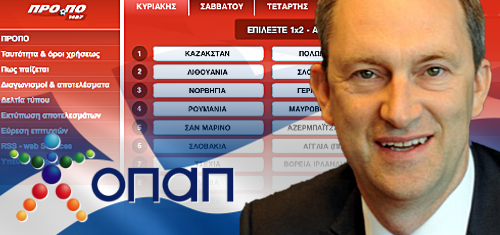 Greek betting operator OPAP saw its net profit fall more than one-third in the second quarter as new taxes took their toll.
Greek betting operator OPAP saw its net profit fall more than one-third in the second quarter as new taxes took their toll.
In the three months ending June 30, OPAP reported total wagering turnover of €1.02b, down 2% from the same period last year. But net gaming revenue fell 17.7% to €125m, earnings shrunk 26.5% to €68m and net profit fell 36.4% to €33m.
The profit decline came courtesy of the Greek government, which raised OPAP’s tax rate from 30% to 35% retroactive to January 1, 2016. Had the old rate still applied, OPAP says its Q2 profit would have risen 2.1%.
Sports betting was OPAP’s star performer in Q2, although total betting turnover was up a mere 1.2% to €94.2m – a fairly minor gain given the Euro 2016 football tournament. Lottery spending was up only 0.2% to €207m while Instant & Passive games slipped 10.2% to €36.7m.
The lack of a proper sports betting lift could have something to do with a 24% reduction in marketing costs during the quarter, reflecting management’s efforts to improve the bottom line by any means necessary.
Ex-Ladbrokes man Damian Cope (pictured), who became CEO of OPAP on July 1, said improving the sports betting product was a major priority. Cope plans to take “the best and most relevant elements of successful sports betting offers in other markets and introduce them to the Greek market as soon as I can.” Cope predicted that “a far superior offering” would emerge over the next 12 to 18 months.
While Cope emphasized the need to become more competitive, OPAP’s official presentation contains protectionist suggestions like “existing digital chaos needs to be regulated with respect to OPAP’s exclusive licenses” and that international competition “needs to be tackled via a coordinated effort.”
For years now, Greece has been promising to revise its online gambling licensing regime and the current government has vowed to issue new licenses to qualified international operators, although little has been said on the subject for some months now.
OPAP is also examining other methods of self-improvement, including a possible update of its ‘anthropaki’ logo, new sponsorship opportunities and the introduction of transnational lotteries.
Another area of focus reflects OPAP’s transition from a state-owned entity to a privately held company. This process resulted in significant staff turnover over the past three years and the company says that it “does not yet have a single, consistent culture,” something OPAP hopes to begin remedying by the end of the year.